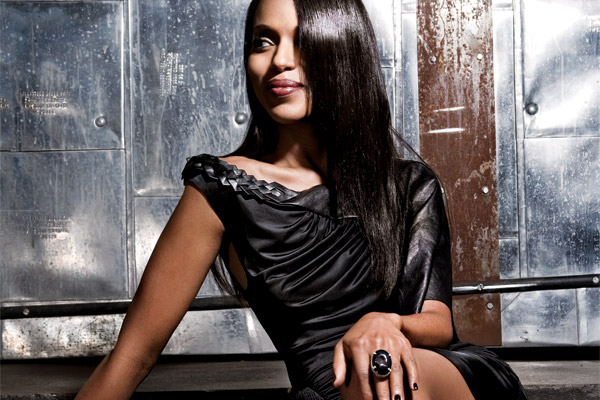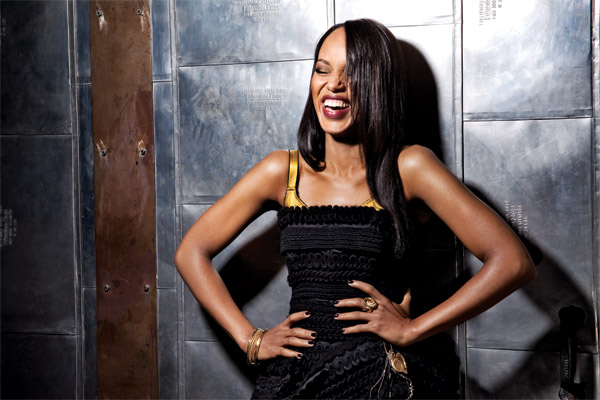
by Zoe Stagg
Some people pleasantly surprise you, and some completely blow you away. From the first moment Kerry Washington begins assuredly explaining her self-created, Interdisciplinary Performance Major, you know you’re dealing with someone who not only entertains, but thoroughly understands the function of performance as a way to understand the world around her. “I have always been fascinated with the power and relevance of performance in society. We all know that when you go on your first date, you are in some ways performing your identity. But it extends to cultural rites of passage, cultural performance, to the history of Shakespearean performance, to what does Glee tell you about the current state of arts education in America.”
Washington was nurtured into the sharp, smart, and savvy woman she is today long before she set foot in a college classroom. “I really grew up in a household where civic engagement and public service was just part of the dialogue all of the time. My mom is a retired Professor of Education, and before that she was a teacher in the New York City public schools, so teaching, giving back, sharing, those are just the bricks that built the home that I grew up in.” Far from sheltered, Washington was encouraged to participate fully in the communal project of existence. “When you grow up in a household where from a very young age, you’re talking about Affirmative Action and abortion rights and gentrification and environmental racism, you begin to connect issues to real life. You begin to see how much of life is political, and if not political, then culturally important.”

She has built an empire upon this vision with projects that extend from Hollywood to Capitol Hill. Though Washington is certainly known for her work in The Last King of Scotland, Ray, Mr. & Mrs. Smith, I Think I Love My Wife, and Save the Last Dance, inside the Beltway she’s a power player of a whole different sort. “Most of my work with arts education comes from my work on the President’s Council on the Arts and Humanities. Obviously, being an advisory committee to the White House, we focus a great deal on the importance of arts in education, because we focus on the importance of arts in society.” Not a recent fixture in D.C., she’s been lobbying and advocating for this cause for years. “When you study an art, you actually learn to become a problem solver. Your brain figures out how to solve problems creatively and individually. I look forward to the day where we don’t talk about arts education like it’s a separate world of learning unto itself.” Rather, it is a unique way to take power into your own hands, whether by brush or by banjo. “The actual moment of creation happens through and because of you.”
Washington landed her committee role after being a major player in Barack Obama’s campaign, making it her mission in 2008 to make political involvement dazzling, important, and sexy. “You had people all over the country who were really fired up for the first time to participate in their democracy from the grassroots level. These people are now working for the government. These people are now doing public service, working for our government to make this country a better place from the inside.” Washington often runs into those same inspired people who are still making a difference, long after the ballot boxes have been put away. “It’s so exciting because that’s what a democracy is supposed to be. Everyday heroes who say ‘I’m going to devote my life to making this a better place,’ and that’s what you see happening. I don’t think we can ever stop being involved. I feel really lucky that I grew up in a household where the importance of voting was instilled very early on.”
Even through political struggles like Don’t Ask, Don’t Tell and Gay Marriage, the clash of ideas is where our country is tried and tested. “I think what you’re faced with is the reality of what America is. It’s this place that has always been filled with people who think in many different ways, and who are allowed to do so. Part of what’s exciting and wonderful about living in America is that we have to find a way to all live together and decide as a nation what the rules are. And that’s the process that you’re watching.” It’s not an insurmountable obstacle. It’s a process to fulfill our destiny. “I think we’re constantly witnessing American trying to fulfill its own vision of ‘liberty and justice for all.’”
Just like Washington views performance and politics as a stew-pot of disciplines, her work on behalf of the environment is about much more than just hugging trees. She mentions Majora Carter, an environmental activist from the Bronx, as an inspiration. Carter is at forefront of the idea of environmental racism. Explaining the concept, Washington says Carter “really does a lot around connecting the idea of what’s going on in impoverished communities and their lack of parks, open spaces, and clean air. And drawing attention to the fact that in low-income places you have fewer parks, and more waste disposal sites and often more truck pollution. Just because of the way these communities exist, they’re facing a different kind of danger in terms of the environment they live in. It happens all over the United States and all over the world.”

Environment bleeds into economics which gives way to health and humanity. Interdisciplinary life. “You look at the statistics and think ‘wow.’ There’s much higher levels of asthma and diabetes and obesity in these communities and you can see that’s because there are no parks. Where are people going to go out and take a walk? You begin to look at ways that the environment is contributing to the inequity in other ways, like health conditions and learning disabilities.” Not to mention the dearth of affordable and available produce. “In some communities, it’s much more difficult to buy an apple than it is to buy a candy bar. That’s why I’m so blown away by what the First Lady is doing around nutrition and exercise in terms of her “Let’s Move” initiative and the White House kitchen garden. It’s moments like that that just make me extra, extra especially proud to be a part of this administration.”
Though her well-rounded bag of expertise makes it seem like she has seven full-time jobs, acting is certainly no afterthought. Cast with a powerhouse slate of women in Tyler Perry’s screen version of Ntozake Shange’s play, For Colored Girls Who Have Considered Suicide When the Rainbow Is Enuf, Washington wasn’t star-struck by the lineup as much as thunderstruck. “For me, to be really honest, what was really touching was that these women – some of whom I’ve looked up to, some of whom I don’t think I’d be an actress if it wasn’t for them, some of whom have been real role models and sources of inspiration – I never even imagined that we’d get to do a movie together.” The project was a chance to erase the constant cycle of peer competition and finally tell the same story.
Washington continues the theme of a year of strong parts in Night Catches Us, opposite
Anthony Mackie. “The film is about two former Black Panthers and we meet them ten years after the height of the movement. They’re two people who are struggling to make sense of their lives after being involved in that kind of movement.” Though the film looks at the members of a movement through a historical lens, Washington notes the current landscape is just as defined by the divisive nature of strong beliefs, and that present activists risk the same chance of having their passion be misunderstood. “Sometimes we think about these movements in history, even present day movements, in terms of caricatures and in terms of the image. If it’s the Panthers, it’s the Afros, and the fists up in the air, and the machine guns, and if it’s the Tea Party movement, burning leaders in effigy or wearing tea bags on their ears. We have these kinds of stereotypes in our heads, and what the movie forces you to do is remember that these people, are people.”
A member of the President’s administration who’s able to view the Tea Party Movement with sympathy? Well, yes. She brings the notion of activism full circle, drawing on her intellectual arsenal of performance theory. “That’s part of the gift of being an actor. Your job, literally, is to put yourself into someone else’s shoes. I think I learned that I may not agree with somebody else, but because of what I do, I do tend to have a level of compassion for who somebody is and how they became that person.” So tea bag earrings and inflammatory posters aside, “People who belong to a movement are still human beings.”

The ability to see and appreciate the rainbow of humanity in art, in politics and life can be blamed on her Bronx roots. “As I’ve traveled around a lot, one of the things I really love about New York is the ways in which we live with each other. It’s not a city that is incredibly segregated. We’re much more involved with each other. I don’t just mean racially. I mean religiously, culturally, economically, linguistically… There is so much diversity you come in contact with as a New Yorker.”
Though her heart is here, her travel continues to bombard Washington with some of the most inspiring company the world has to offer. It’s a perk of the job that stirs up gratitude. She recently attended the L’Oreal Women of Worth Awards, where Shannon Lambert was honored for Pandora’s Project, a non-profit that provides services to survivors of sexual violence. “[Lambert] reminded me how powerful we all are. It’s not about celebrity; power is not really an external thing. When we don’t feel powerful it’s because we’ve forgotten who we are, or that no one has taught us who we really are.” Power, then, is not a fluke or a finite commodity. “We all have the capacity to be powerful human beings in the world if given the right tools, if given the right opportunities. Power isn’t something somebody else has. It starts with one person.”


